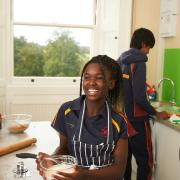The Good Schools Guide advise on making the right choices when it comes to GCSES.
The Good Schools Guide advise on making the right choices when it comes to GCSES.
1. Quality not quantity. Choose a manageable number – eight or nine is usually plenty – and make sure to get the best results you can.
2. Don’t believe anyone who tells you they don’t matter. The stiffer the competition for university places and jobs, the more pupils need good GCSEs to help them stand out from the crowd. Weak GCSEs can bring down a promising academic career: most sixth form colleges ask for five A-C grade GCSEs for entry. The same goes for the sixth forms of many schools.
3. Choose subjects you’re good at. It may sound obvious, but you’d be surprised how many 14-year-olds decide to drop a subject in which they excel, because they are ‘sick of it’ or ‘have been doing it forever’. If it ain’t broke, don’t fix it. Stick with the tried and tested, and get your kicks by taking up a new subject that brings diversity to your profile.
4. Choose subjects your school is good at. Have a look at your school’s GCSE results over the last three years. Do some subjects shine out? Don’t choose a subject just because others have done well at it in the past, but it’s helpful to know where your school’s strengths lie. If you’re not sure, check out your schools’ exam records at www.goodschoolsguide.co.uk
5. Tick off any prerequisites for the future. Pupils thinking about medicine should take a full slate of sciences – the max your school offers – plus maths. History and a language are useful if you are planning to be the next Horace Rumpole. Schools usually require at least a GCSE C to continue with a subject at A level (some require a B, or even an A) so if you’re hoping to do a subject in sixth form, whack it on your GCSE list.
6. Think about employment, but go easy on the vocational GCSEs. Successive governments have tried to raise the standing of vocational GCSEs, but a mixture of unfamiliarity and British snobbery means that many people still view them as second class qualifications.
7. Avoid choosing too many creative subjects. Art, music, drama, DT, photography, graphics, dance…these can be fun and bring breadth to your studies, but they are also time sinks, requiring hours of practice, rehearsals or studio time. For most people, one is enough.
8. Embrace the English Baccalaureate. Your school will want you to study maths, science and English. Try to include the other two Ebacc subjects: a language and a humanity (history or geography). Believe it or not, they are usually easier than more esoteric subjects. And too many GCSEs in subjects like outdoor pursuits, Buddhism or ceramics (yes, those are all offered as GCSEs) can scare off employers and universities.
9. Look at your choices from a distance. Write down your list of subjects and look at it as a future employer or university admissions officer might. You want it to shout maturity, rigour, breadth.
10. Study what you love. Ignore all of the above if need be, but make sure to include at least one subject that excites you. Don’t let anyone put you off film studies (quite a lot of work, incidentally) if your universe revolves around the cinema. Don’t worry if your tutor says that doing the new GCSE in moving image arts will make people think you’re n airhead. Man cannot live on simultaneous equations alone. If you choose a strong core of English, maths, sciences and a language, you can go a little wild around the edges!
Janette Wallis is a senior editor of The Good Schools Guide. Check out the new Good Schools Guide website for university entrance data, catchment area maps, daily discussions and candid reviews of over 1,000 of Britain’s best state and private schools.


























